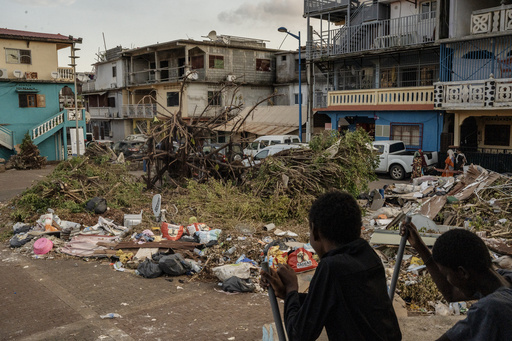MAMOUDZOU, Mayotte — French President Emmanuel Macron visited the Indian Ocean island of Mayotte on Thursday to assess the damage caused by Cyclone Chido, which has left a path of destruction across this French territory. Upon his arrival, he was met with harrowing testimonials about the consequences of the cyclone, which hit the islands Saturday with winds exceeding 220 kph (136 mph), causing extensive devastation.
“Mayotte is demolished,” stated Assane Haloi, a security agent, who firmly grasped Macron’s hand as he expressed the dire situation on the islands. Haloi conveyed the critical lack of basic necessities, highlighting the ongoing struggles for shelter amid the widespread destruction. “There is no water, no electricity, and we’re all soaked, trying to cover ourselves to sleep,” she lamented.
During his visit, Macron was enveloped in mixed emotions, offering consolation to some residents while facing criticism from others regarding France’s response effort. He toured affected areas, including a hospital, and surveyed the wreckage from a helicopter. Macron acknowledged the gravity of the situation, cautioning that the number of casualties could rise.
Currently, at least 31 lives have been lost, and over 2,000 individuals have sustained injuries, with more than 200 in critical condition. However, authorities fear that the real death toll could be significantly higher. As journalists began arriving on the island, poignant accounts emerged from survivors who experienced the cyclone’s wrath firsthand, where homes were uprooted or demolished.
In the slum area of Kaweni near Mamoudzou, the destruction was evident, with remnants of homes scattered across the hillside. “We are still in shock. It’s disheartening and we can hardly find restful sleep,” shared Nassirou Hamidouni, who was sifting through the ruins of what was once his home.
The cyclone wreaked havoc on essential infrastructure, cutting off power and leaving many without access to clean water. Supermarkets are running low on supplies, with some shelves completely bare. Long queues formed at gas stations, where motorists waited hours to refuel, while others camped out at water pumps in hopes of retrieving clean water. Ramou Madi, a mother of two, expressed her struggle, noting the desperation for water to keep her family clean, saying, “We can’t shop; there’s nothing in the shops. It’s all about getting water for the kids.”
In an effort to provide reassurance, Macron announced that significant aid, including food and medical supplies, had reached the island, with more on the way. A healthcare worker in a psychological unit called for additional staff due to exhaustion from non-stop operations. Macron, donned in a traditional Mayotte scarf, comforted her as she expressed her distress.
The visit turned confrontational when an islander confronted Macron about the slow aid response. The president defended military efforts to clear roads and facilitate aid delivery, but tensions remained palpable with residents demanding immediate assistance. He assured that restoration of power and water was a priority, with an aim to restore about half of the services by the following day.
The government plans to deploy approximately 1,200 police officers to maintain order and prevent looting. Macron also addressed the island’s migrant populace, noting the necessity of providing aid without discrimination, as some migrants face severe health risks without medical attention.
Many residents are consumed by uncertainty regarding their loved ones, with distressed families mourning the rapid burials needed by Islamic customs that require dead bodies to be laid to rest swiftly. “We are dealing with open-air mass graves,” lamented Estelle Youssoufa, a representative for Mayotte in the French parliament. Macron admitted that many casualties hadn’t been officially recorded and said efforts would be made to restore communication services to help families locate missing individuals.
Mayotte is classified as France’s poorest territory, harboring a population of around 320,000 alongside an estimated 100,000 migrants. The island sits between the eastern coast of Africa and northern Madagascar. After a referendum in 1974, Mayotte chose to remain a part of France, diverging from neighboring islands that gained independence.
The cyclone’s impact was stark, with neighborhoods completely devastated, as many residents ignored warnings, believing the storm might not be severe. Evidence of the turmoil frequented various locations where displaced residents sought shelter with the generosity of schools and community spaces.
Families found refuge wherever they could, including schools where hundreds sought solace while women washed clothes in basins nearby. One mother spoke of her family’s loss, recounting the tragic death of her brother in the hospital, highlighting the added struggle of retrieving his body amid the chaos.
Amidst Macron’s interactions with residents in Kaweni—where he shared hugs and compassion—he drew parallels between the recovery process of Mayotte and the recent restoration of the Notre Dame Cathedral. He expressed his commitment to expedite recovery efforts through special legislation in Paris aimed at rebuilding infrastructure and creating safer housing for those affected, stating, “If we managed to restore our cathedral in five years, it would be a tragedy if we fail to rebuild Mayotte in the same timeframe.”


